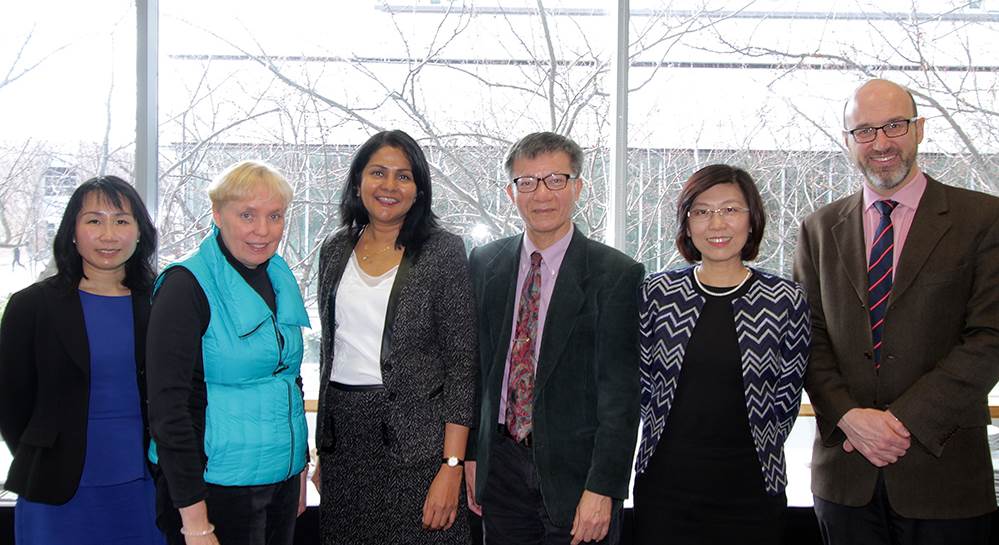“Natural Resources Management: National, Regional and Global Issues” Seminar at York University on February 1

A seminar entitled “Natural Resources Management: National, Regional and Global Issues”, organized by the York Centre for Asian Research, was held at York University on February 1 and hosted by the Centre’s director, Dr. Philip Kelly. Three distinguished scholars: Professor Der-yuan Maxwell Wu from National Chengchi University in Taiwan, Professor Kathy Young, from the Department of Geography at York University, and Professor Venilla Rajaguru, the course director at York University for Science and Technology Studies, and Environmental Studies, presented their research on cases of resolving resource crisis and ecological governance problems in China, Taiwan, Canada, and Austria. More than 60 faculty members and students, Catherine Y.M. Hsu, director general of the Taipei Economic and Cultural Office (TECO), Toronto, and Alice Wang, the TECO office director, attended the seminar
Before the panel discussion, Catherine Hsu welcomed the audience, and thanked Professor Wu for traveling the long distance to Toronto to provide the seminar with a Taiwanese scholar’s viewpoint. She then briefly outlined how Taiwan’s diverse geography supports a resource-rich ecological system that was gradually undermined by industrialization and urbanization during rapid economic growth. Fortunately, democratization created opportunities for the government to collaborate with civil society to reassess local resource development and management, resulting in numerous successes halting destructive practices. She believes that adopting an international and comparative perspective, and having a panel discussion, exchanging opinions and sharing experiences are extremely helpful.
Professor Kathy Young presented her research on the Canadian High Arctic, and argued that while global warming has contributed significantly to dramatic melting of the world's glaciers, exploitation of oil, natural gas, and minerals has threatened the traditional way of life and well-being of the Inuit people and the conservation of polar bears. Professor Young also attached importance to policy communication processes.
Professor Der-yuan Maxwell Wu from National Chengchi University then presented his research on the exploitation of water resources in China’s Sanjiangyuan Area, where three great rivers meet: the Yangtze River, the Huang He (Yellow River), and the Mekong. Professor Wu’s research shows that great migration of local residents was often undertaken in the name of environmental protection, which in turn had impacts on the transformation and adjustment of economic patterns. His research indicates that there is a connection between public policy and public opinion and that the link is of vital importance. Professor Wu has not observed and is not aware of any similar cases that can be found in Taiwan, where reservoir-building has been adopted to store water and prevent floods.
In her presentation, Professor Venilla Rajaguru discussed the impacts of industrialization and agriculturalization on original ecological species in some parts of Austria and Canada. She treated these as examples that show that the consultation process should include the government, first nation peoples, environmental groups, mining companies, and other stake-holders, in order to prevent development-caused exploitation. She also believes that joint resource management requires cross-border collaboration, while resource development in one area needs to be in alignment with the national, regional, and global agendas for peace, security and environmental protection.
The conclusion reached by the three scholars was that resource management must take into account the interests of local communities and the possible impacts on them. Some of the seminar participants were particularly interested in the aspects of policy communication mentioned by Professor Wu in his presentation, and they continued talking with Professor Wu and Catherine Hsu, exchanging ideas after the Q&A period. It was a lively engaging seminar, covering a range of important issues.
L-R: Ms. Alice Wang, Professor Kathy Young, Professor Venilla Rajaguru, Professor Der-yuan Maxwell Wu, Ms. Catherine Y.M. Hsu, and Dr. Philip Kelly
